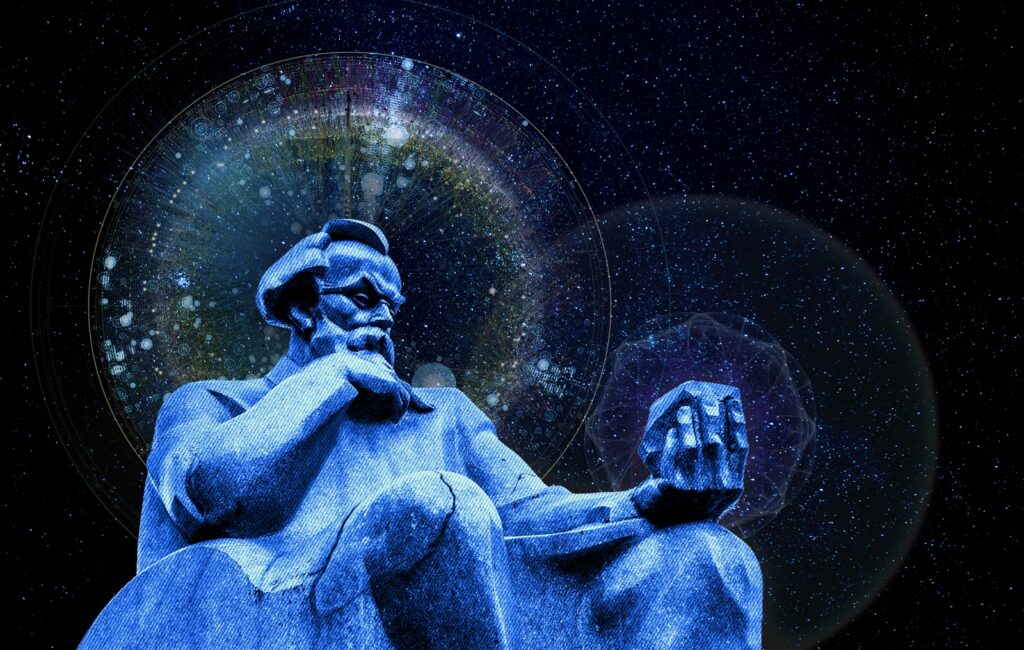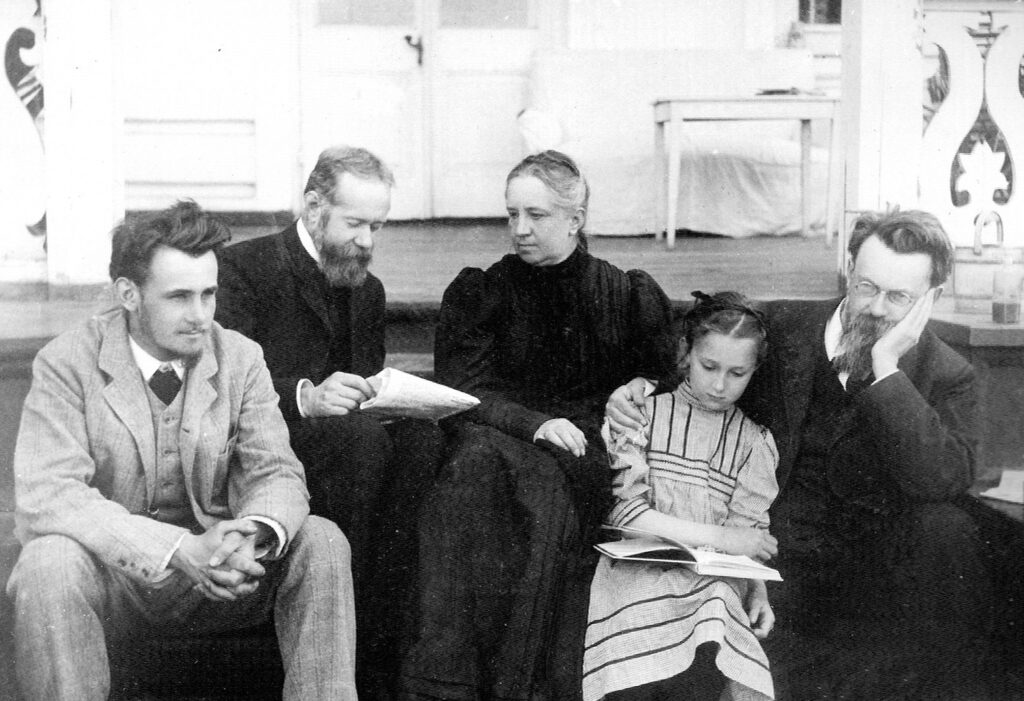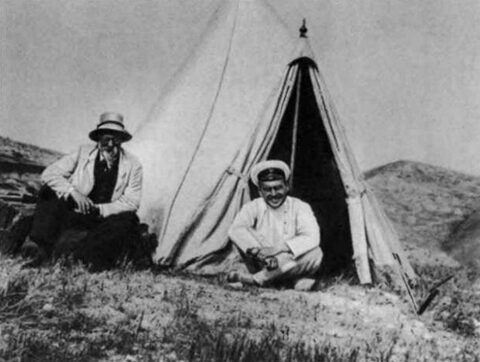March 12 marks the 161st anniversary of the birth of scientist and philosopher Volodymyr Vernadskyi. Modern scientific concepts ideas tend to replace each other ceaselessly, getting old too quickly (sometimes even within a year). Meanwhile the ideas of Academician Volodymyr Ivanovich Vernadskyi still remain relevant. Each and every of our contemporaries know the name of this natural scientist — he is rightly considered one of the most cited scientists, his ideas are increasingly discussed, referred to, his works are admired and criticized. Studies of his scientific heritage and the contemplations on his ideas are still ongoing, as are the disputes over the interpretation of his controversial statements.

How are Vernadskyi’s scientific and philosophical reflections connected with the latest achievements of science and the further development of the space industry? What was the outstanding scientist really like? What led him to a roaring success on a planetary scale? (No exaggeration!) And what recipe for happiness did the academician find? Let’s try to find out.
A worthy descendant of Cossack family
The glorious ancestor of V. I. Vernadskyi was a Cossack of Zaporizhian Sich who fought under the banner of Bohdan Khmelnytsky; the scientist’s great-grandfather was a highly respected priest in the Chernihiv region; and his grandfather distinguished himself as a famous military doctor. Vernadskyi’s ancestors studied at the Kyiv-Mohyla Academy, Kyiv and Moscow universities, where they also taught. There were also writers and bright public figures in his family. The scientist’s father, Professor Ivan Vasyliovych Vernadskyi, was on friendly terms with such prominent representatives of the Ukrainian intellectual elite as T. G. Shevchenko, M. O. Maksymovich, and Mykola Gulak.

Therefore, it is not surprising that the young researcher received a decent upbringing, a brilliant education and, in the end, had all the prerequisites for immersion in science. Together with his father, he chose the field of his scientific interests: natural science.
A traveling scientist
After graduating from the Faculty of Physics and Mathematics of St. Petersburg University, Vernadskyi became actively involved in research work. He worked in numerous laboratories around the world, carried out expeditions and field research, visited almost all regions of the Russian Empire and later the USSR, European and American countries, worked at domestic and foreign biological stations, gave lectures at universities, participated in international congresses and conferences, was published in the world’s leading scientific periodicals, held positions in world-renowned scientific institutions, such as the Curie Institute in Paris or the Geophysical Laboratory of the Carnegie Institution in Washington. His perfect command of 14 languages helped him in travelling around the globe.

So, Vernadskyi played a significant role in the scientific life of many European and American countries, visiting them in person. The international scientific community undoubtedly recognized his merits, electing him an honorary member of numerous foreign scientific academies and societies.
The founder of modern science in Ukraine
In 1918, V. I. Vernadskyi returned to his homeland and chaired the commission for the organization of the Ukrainian Academy of Sciences in Kyiv, later becoming its first president. The scientist based his own concept of creating scientific institutions on leading international experience. Therefore, it is not surprising that the Ukrainian Academy of Sciences is founded on Vernadskyi’s concepts even today. While performing the duties of the president of the Ukrainian Academy of Sciences, the academician was the head of the commission for the organization of the higher school, as well as the head of the Temporary Committee for the establishment of the National Library at the Ukrainian Academy of Sciences, which is now named in his honor. At the same time, Vernadskyi did not stop teaching and actively participating in the development of scientific societies of Ukraine.
Imprint in world science
It is difficult to overestimate the scientific achievements of V. I. Vernadskyi. Researchers point to his contribution to more than 400 significant scientific works on mineralogy, geochemistry and biogeochemistry, radioactivity, crystallography, soil science, minerals, and general scientific issues. As a matter of fact, the scientific areas influenced by the academician in his articles and reports are so numerous that a special issue of our magazine might be devoted just to mention them. The scientist was an outstanding historian of science; he had original ideas that help understand the problems of symmetry, space-time, scientific thought itself as a planetary phenomenon. He formulated the doctrine of the noosphere, highlighted the concepts of “geological time” and “geological eternity”, and studied the phenomenon of the cosmic vacuum. Vernadskyi was the first to study the geology of the Earth in the context of the entire Solar System. And now his theory is the working concept of the international scientific community.
The master of the synthesis of sciences
At the time when modern science has a tendency towards fragmentation and increasingly narrow specialization, Vernadskyi, unlike his colleagues, acted in a radically opposite way, he did not limit himself to one branch of science, he continuously combined different knowledge: he mixed biology with geochemistry, geology with economics , history of science with philosophy. At the same time, various branches of natural sciences, which were combined by Vernadskyi, did not turn into a so-called “scientific soup”, but qualitatively structured a large volume of multi-disciplinary information. This is how new sciences arose: biochemistry, biogeochemistry, radiogeology. In his works, he combined not only the fields of various sciences, but also boldly combined science and art, philosophy and religion, music and crystallography, ethics and culture in his personal and public reflections.
Metamorphoses of the noosphere
The history of the appearance of the very concept of noosphere, that is, “sphere of the mind”, is interesting. Vernadskyi himself is rightly considered to be its father, although he noted that it was coined by analogy with the terms biosphere and atmosphere by the French scientists E. Le Roy and T. de Chardin, who, in turn, were strongly impressed by lectures on the biosphere of Vernadskyi himself in Paris. The researcher happily began to use the apt term, resorted to the further development of the theories of the noosphere and, in the end, formulated a concept called Vernadskyi’s Law of the Noosphere. The scientist predicted that a new, higher stage of the evolution of the biosphere would come, the formation of which is directly related to the development of human civilization, the informational merging of mankind. At the same time, it is the social mind that will play the most important role in the further development of nature. The noosphere, as a part of the planet and circumplanetary space marked with traces of human activity, will constantly grow with our expansion into outer space and can reach immeasurable scale.

It is fascinating to observe how the theories of the noosphere are developing in modern science. For example, on the basis of the operation of an orbital station, scientists are able to study the interaction of three shells as components of the noosphere: the biosphere, the technosphere, and the sociosphere. The station has become a simplified model of a small planet, which clearly shows the interconnectedness of shells and the critical dependence of human life on them, where small actions lead to large consequences. Meanwhile, as inhabitants of the Earth we do not think too much about all the overly complex cause and effect relationships which routinely do cause great tragedies. Unfortunately, in 2020 that we were able to observe such a connection as exemplified by events in Beirut or Wuhan.
Optimism on a planetary scale
Vernadskyi is rightly considered a prophet in science, and he voiced all his predictions with a touch of optimism, believing in humanity’s ability to learn to coexist in harmony with nature, while using the latest advances in science and technology. According to Vernadskyi, the negative nature of man-caused processes is a temporary phenomenon which should be overcome due to scientific progress. He envisioned the development of numerous types of alternative energy. To Vernadskyi’s scientific prophecies, it is worth adding the human exploration of the Moon and planets as a feasible task of the near future, as well as rendering human life eternal. The scientist admitted that a careful study of the history of science helps him correctly determine the further trends in science and have an optimistic perspective on the process of human development.
A model scientist
According to Vernadskyi, the recipe for a scientist’s success is quite simple: cold mind, passionate feelings and a little creativity. The scientist believed that scientific research changes a person, and it is necessary to start with the mental hygiene, because science cleans the mind and promotes the realization of individuality. Limitless freedom of thought is a pledge of the discovery. And an acute sense of dignity, responsibility and respect for each person are mandatory features of a successful and happy scientist. In addition, a real researcher must necessarily have civic courage. An example of such a scientist is Volodymyr Ivanovich himself. As a sincere public figure, he was not an outside observer and was not afraid to defend his clear position in the atmosphere of panic, severe upheavals, epidemics, Stalinist repressions, and war. The scientist’s daughter, Nina Vernadska-Tol, mentioned in her memoirs that her father was absolutely fearless and never went against his conscience.
So, V. I. Vernadskyi became the creator of a new scientific worldview, proving beyond doubt that each and every person is truly a universal phenomenon, and the human mind will emerge as a powerful cosmic force that will be able to withstand any future ecological and spiritual catastrophes.

